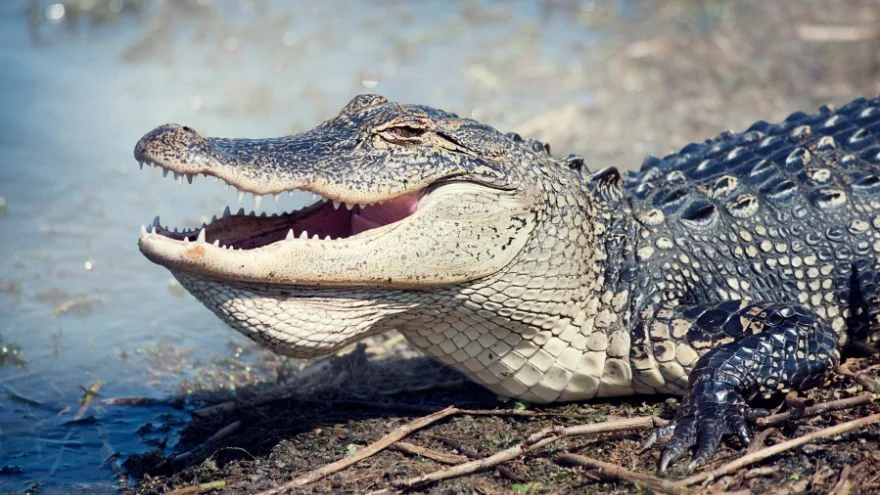It is common knowledge that alligators are carnivores. These aquatic reptiles have really large and powerful jaws full of sharp teeth.
They can live in saltwater and freshwater, which gives them access to various food sources. But how do alligators taste their foods? Do they have tongues and taste buds?
Alligators have very large tongues that almost extend to the entire length of their snout, unlike crocodiles. An adult alligator tongue can reach a length of 2ft and is made of muscles and fat.
Do Alligators Have Tongues?
Alligators do have tongues, just like the majority of other animals.
Generally speaking, their tongues are wider than a crocodile’s tongue. Their tongues also aid in the complete digestion of their meal.
Alligators evolved in such a way that allows them to keep from getting fluid in their stomachs or lungs since they spend most of their time submerged.
The palatal valve, which is attached to the back of the tongue, is the best approach.
They can seal this valve with their tongue while submerged, preventing water from entering the trachea.
Once the valve is shut, the alligator can snap on prey underwater by opening its mouth wide without water getting into its throat.
How Long is an Alligator’s Tongue?
The tongue of an alligator can expand to a length of two feet (60 cm), making it nearly the same length as its snouts. The tongue fills the whole space between the lower jaw.
Do Alligators Have Taste Buds?
Alligators do have taste buds. These taste receptors are located on the tongue’s upper palate.
They employ them to determine whether or not the substance being bit is food.
Alligator hatchlings, in particular, have larger papillae than adults. The mechano-receptive or chemosensory structures, often known as taste buds, are housed in the tongue’s papillae.
These papillae are smaller in sub-adults, and it is believed that adult alligators have taste buds that have degenerated.
As a result, scientists have hypothesized that taste buds change their role from merely controlling prey in adults to detecting a target in hatchlings.
Do Alligators Stick Their Tongues Out?
Yes, alligators can stick their tongues out. Many believe that alligators cannot put their tongues out, just like crocodiles, because these reptiles have striking similarities.
What Do Alligators Use Their Tongues For?
Alligators have tongues, just like many other animals. If you’ve seen an open alligator mouth, you likely noticed its enormous tongue sitting there or even flapping around as the animal consumed its meal.
An alligator’s tongue aids in:
Body temperature regulation
Alligators are ectothermic (cold-blooded) and, like most reptiles, do not produce their body heat.
By traveling between hot and cool environments while soaking up the sun, alligators build up body heat.
Their tongue can assist control the body’s temperature as it rises, preventing overheating.
Keeping water out of the airways
The gator’s tongue is an elastic stalk that keeps water out of its airway.
It prevents water from entering the airway, making it eat more easily, and keeping it from choking on its food.
Swallowing its prey
If a crocodile is unable to swallow its prey completely, it may occasionally prod its tongue forward and push its cheeks forward to aid in creating a seal at the back of its mouth.
Other times, it might even grab the prey by the neck or tail with its tongue to further immobilize it before swallowing.
Controlling the amount of salt in their bodies
An alligator will start producing a substance called renin if salt is depleted from its diet for an extended period.
The bloodstream circulates renin, which starts to degrade the blood cells.
On their tongues, alligators have salt glands. An alligator’s salt glands, however, are less efficient. It also has sensory pits close to its mouth in addition to these glands.
Frequently Asked Questions
What animals dont have tongues?
Sea stars and other echinoderms, insects, and crustaceans are examples of animals without tongues. They still need to eat to survive even though they don’t have tongues.
How is an alligator’s tongue distinct from a crocodile’s?
Alligators can extend their tongues, but crocodiles are unable to. Gators did not evolve to have a membrane that holds their tongues in place.
An important part of its tongue is the palatal valve that closes whenever the alligator is submerged.
A patch of flesh covers their throat to prevent water from rushing in, allowing them to open their mouths even while wholly submerged.
Can humans eat an alligator’s tongue?
Alligator tongue is eaten in several cultures. It is low in fat and high in protein. In contrast to beef, which is high in cholesterol, an alligator’s tongue is highly healthy for people.
What does alligator tongue taste like?
Alligator tongue is said to taste like chicken by food lovers. It can be chewy depending on how the tongue is prepared. Some claim there is a slightly fishy smell. Probably due to the low-fat content.
Wrap-up
You now know that, unlike what some people may think, these enormous reptiles do have tongues.
The tongues of alligators are attached to a palate valve. When they are submerged, they employ this muscle to close the valve.
The prey is then swallowed as they surface. They may so expand their mouths underwater to bite while keeping water out.
Also See: Are Alligators Bulletproof? How Thick Is Alligator Skin?
![Do Alligators Have Tongues & Taste Buds [Answered] (1)](https://animalvivid.com/wp-content/uploads/2022/09/Do-Alligators-Have-Tongues-Taste-Buds-Answered-1.jpg.webp)

![Do Alligators Shed Their Skin [Answered]](https://animalvivid.com/wp-content/uploads/2022/09/Do-Alligators-Shed-Their-Skin-Answered.jpg)
